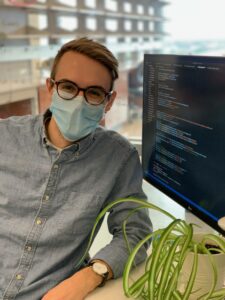In the spring of 2021, 44 PhD students from a range of academic disciplines at Penn participated virtually in Career Services’ PhD Career Exploration Fellowship (CEF) program, where they were matched with a host organization to learn about different careers beyond academia. Nathan Kendsersky, a PhD candidate in Pharmacology, was placed as a Fellow with Janssen – Translational Sciences. Read about Nathan’s experience in the CEF below!
 Describe your experience working with your host:
Describe your experience working with your host:
Dr. Sheng Gao at Janssen was an excellent host for the CEF. During the fellowship, Sheng organized 12 informational meetings with members of his extensive network. These individuals had diverse backgrounds and experiences, and included bioinformaticians, molecular biologists, clinical scientists, and medical science liaisons. Sheng included scientists across the drug development pipeline (discovery, translational, clinical) at different points in their careers (scientist-and director-level). It was extremely valuable to gain both perspectives, as entry-level scientists shared tips on transitioning to industry and director-level scientists suggested strategies for applicationsand interviews. I also hadweekly meetings with Sheng to recap the informational interviews, ask additional questions, and propose new ideas for future meetings.
What did you learn from this opportunity (about yourself, about career fields, the job search, etc.)?
Through the CEF, I was able to clarify the similarities and differences between research in academia as a graduate student and research in industry as a scientist. By talking to scientists at various points along the drug development pipeline, I was familiarized with the matrix work environment and learned how each employee contributes to projects in the company’s portfolio. I was also able to appreciate how non-research positions were integrated along the pipeline and how a PhD is valuable to these careers.
How does your CEF experience benefit your future career plans?
As a non-GCB student interested in pursuing bioinformatics, I learned how to best market myself as a multi-disciplinary scientist. I was given specific advice on online classes to take, analyses to apply in my project, and conferences to attend that can further my bioinformatics experience and skillset. I also had the opportunity to speak with hiring managers to better understand how to best approach the application process with tips about resumes, cover letters, and interviews.
What was the most valuable part of your CEF experience?
The most valuable part of the CEF was learning how to network outside of academia. Before this program, I was only comfortable connecting with industry scientists with whom I had a previous working relationship. Through the CEF, I became more confident reaching out to less familiar scientists to learn more about their position and their transition from their PhD program. I also expanded my network by connecting with over a dozen scientists that have expressed a genuine interest in my career development and have offered to meet again when I am closer to applying.
Top reason PhD students should apply to the CEF:
The CEF program offers an inside look at non-academic careers by connecting one-on-one with individuals in a specific discipline. The informational interviews are an excellent way to rule in or rule out possible career paths, especially if you are unsure. It is also immensely valuable to have contacts outside of academia to ease the transition from one’s PhD work and help through the application process. Throughout the fellowship, Penn Career Services also held small group workshops where students received constructive feedback on their resumes and LinkedIn profile pages. I cannot recommend the CEF enough.




